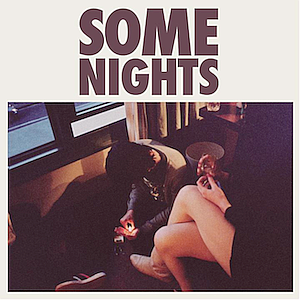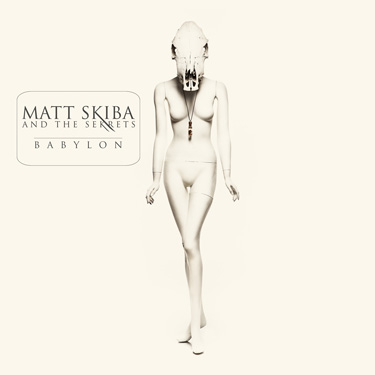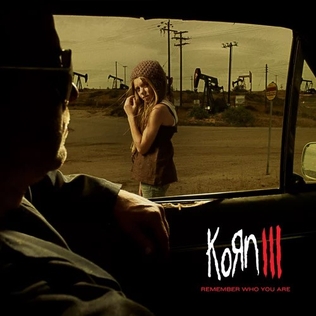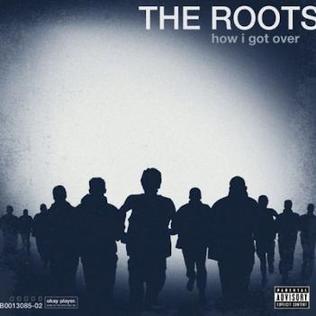The amount of albums that came out in 2012 is staggering.
Wikipedia can give you a general idea but the truth is unless you're Michael Fassbender in
Prometheus, that's not a math problem you'll have fun solving. Yet it's become increasingly apparent that when I roll out my end of the year lists, I spend I great deal of time with records that don't end up represented in that coveted collection. So here are the less-sung heroes for me, the albums that brightened my 2012--the ones worth your time but impossible to place. Enjoy!
Alabama Shakes- Boys & Girls (***½): Brittany Howard’s soulful
pipes and brash blues riffs are tailor made for fans of Sharon Jones and the Black
Keys’ most recent stab at retro chic.
Amanda Palmer & The Grand Theft Orchestra- Theater Is
Evil (***): The Wagnerian/Elton John ambition is there, but Palmer’s
Kickstarter-funded project plays more like Dresden Doll b-sides instead of a
creative manifesto.
 Bad Books- Bad Books II (****½):
Bad Books- Bad Books II (****½): A bit foggier, and sporting
more keyboard quirks,
Bad Books II finds the Andy Hull/Kevin Devine braintrust
going strong with sensitive-guy charm.
BADBADNOTGOOD- BBNG2 (****½): Anything but bad, BBNG2 finds
basement jazz masters balancing tight drums, slinky bass twitches, and a
healthy side of hip-hop swagger, mingling with their free-form ambitions.
Beach House- Bloom (***½): Playing like Teen Dream at
midnight, Bloom continues Beach House’s preoccupations with ethereal chimes,
breathy whispers, and cooler end of 80s new wave.
Ben Gibbard- Former Lives (***½): The sweeping string arrangements
and sweet sentimentality owe a great deal to the Beatles, but much like
Gibbard’s idols, solo record will make fans hungry for his former band.
Blockhead- Interludes At Midnight (***½): Aesop Rock's favorite DJ casts swervy, late-night
shadows and sports dense beats that would make Beck Hansen blush.
Clams Casino- Instrumental Mixtape 2 (*****): Dramatic without being overly pretentious, Michael Volpe's latest batch of larger than life beats borrows from nightmarish landscapes, intoxicating trip-hop, and just enough movie score gravitas to make E.S. Posthumous proud.
Cat Power- Sun (***): Charlyn Marshall’s fascination with
David Bowie's Low era pushes her band to try on summertime synths
and trip-hop thumps where her smoky bar presence would typically reside; call
it sobering if a bit somber.
 Crystal Castles- Crystal Castles (III) (***½):
Crystal Castles- Crystal Castles (III) (***½): Alice Glass'
Apocalypse-pixie shtick is warped into oblivion but Ethan Kath's thin,
fluttering beats, make longtime listeners hungry for the thick low-end of
Crystal Castles (II).
David Byrne & St. Vincent- Love This Giant (***½): Floating in a sea of clamoring
horns and awkward funk, David Byrne and Annie Clark only really click when they
focus their energy onto icy synth-sprawls.
Death Grips- The Money Store (****): This chopped up punk-rap is blasted with noise and staccato samples, while MC Ride's tortured braggadocio makes Tyler, The Creator look like Bruno Mars.
Divine Fits- A Thing Called Divine Fits (***½): Sporting Wolf Parade's wavey atmospheres and Spoon's angular bass-heavy work-outs, Divine Fits' 80s-ramped debut is the perfect antidote to a lonely night drive with nothing to do.
Fiona Apple- The Idler Wheel Is Wiser That The Driver Of The Screw And Whipping Cords WIll Serve You More Than Ropes Will Ever Do (****): Older, wiser, and more neurotic, Apple's fifth LP specializes in
free-jazz anachronism and bitter communication breakdowns.
Flying Lotus- Until The Silence Comes (***): If you can
stand how ADD-riddled FlyLo's Alka-Seltzer style beats are, his Miles Davis
approach to warped dubby samples might just be for you.
 Garbage- Not Your Kind Of People (*****):
Garbage- Not Your Kind Of People (*****): Butch Vig and
Shirley Mason's victory lap; an LP that truly embodies their band from film-score
grandeur to electronic-robot rock, and the effervescent cool-gaze that
separated them from their 90s contemporaries.
Gold Motel- Gold Motel (***½): Sleepy and subdued, Greta Morgan
continues to plunk around her keys while the rest of her group channels
retro-Beach Boy vibes.
Green Day- ¡Uno! (****½): Berkeley’s National Treasure keeps it short and sweet with songs about personal empowerment and love, channeling
Cheap Trick and their Gilman days with Ramones-style energy.
Green Day- ¡Dos! (****): If you were looking for the 60s
trash-rock sequel to Foxboro Hot Tubs’ Stop Drop & Roll!!!, look no further
than this lustful batch of garage-ready cuts—just don’t be surprised when the
party comes crashing down.
Green Day- ¡Tré! (****): After Billie Joe and Co. made a
mess of the whole damn place they put the evening and their lives in
perspective; ¡Tré! fluctuates between lean and mean pop-punk, 50s rock n’ roll
glamour, and Green Day’s multi-suite American Idiot ambitions.
Hot Water Music- Exister (****): With some modern production
and heaving bass lines, Chuck Ragan’s rag-tag punk battalion sounds like the powerful basement
band he’s heard in his head since the very beginning.
 How To Destroy Angels- An omen_E.P. (***½):
How To Destroy Angels- An omen_E.P. (***½): Feeling more
like sketches than a full body of work, Trent Reznor’s anxiety humming glitches
and twitches coast under his wife’s siren-worthy presence.
Jack White- Blunderbuss (***): The Hardest Working Man at
Third Man Records opens up his blues-rock vault, revealing that the discipline
in his other groups allows him to serve up sizzle instead of the lukewarm
Grammy fodder on this solo LP.
Japandroids- Celebration Rock (****): Earnestness never felt
so tremendous as this duo powers through 9 cuts of “forever young” epiphanies,
sounding like a proper 5-piece in the process.
Lamb Of God- Resolution (***½): Randy Blythe may be facing criminal
charges overseas but let’s not forget his band’s immense fury—Resolution
marries expansive dirges with rattlesnake riffs, making Blythe’s legal battles
sound like child’s play.
M. Ward- A Wasteland Companion (***½): Playing like the kind
of songwriter that plays bars in the evening and sleeps during the day, Ward
conjures up some old folk magic on his latest album.
Macklemore & Ryan Lewis- The Heist (***½): The
synthesizers are glitzier, the beats bigger, and the sound brighter as
hip-hop’s resident boy scout churns out an album of strikingly honest rhymes.
 Matt Skiba & The Sekrets- Babylon (****):
Matt Skiba & The Sekrets- Babylon (****): As if Matt
Skiba’s back catalog wasn’t expansive enough, the hyper caffeinated power-punk
punch and textured Cure-keyboards on
Babylon remind us all why he inspires such a devout,
albeit gloomy, following.
Memoryhouse- The Slideshow Effect (***½): Soft and sweet,
like a mid-afternoon nap, The Slideshow Effect is an exercise in syrupy
melodies and breathy allure.
Mumford & Sons- Babel (****): Though the group trades in
some of their quaint bluegrass flair for some feverish acoustic energy, Babel
is the kind of album that ascends on the backs of thick harmonies and heartfelt
stories.
Muse- The 2nd Law (****): Looks like Matt Bellemy
just flipped through the Mos Eisley jukebox: Some flashy Zeppelin riffing,
operatic Queen flourishes, blitzed-out electronics, and some blooming snyths
jettison The 2nd Law into its own musical galaxy.
Motion City Soundtrack- Go (***): Slightly more subdued,
Justin Pierre leads his usually bouncy band through the inner workings of his
half-acoustic Atari heart—think bed room confessionals for gamers.
Neon Trees- Picture Show (***½): Mining the 80s for all
their pulpy thrills, the Neon Trees move past their Sandals-ready sound to
something bigger, brasher, and surprisingly artier.
 Norah Jones- Little Broken Hearts (***½):
Norah Jones- Little Broken Hearts (***½): Danger Mouse is
gonna Danger Mouse, which amounts to a smoky record with tight drums, but Jones
reminds us that her honey-smooth voice is the real reason we’re tuning in.
oOoOO- Our Love Is Hurting Us E.P. (****): Call it make-out
music for ghouls but these witch house pioneers continue to take their warped
vocal warbles and click-clack beats to Halloween-style heights.
Passion Pit- Gossamer (****): Holy 1980s Batman--If you’re
looking for some slick keyboards, hooks engineered to move Mentos, and some spaztic
pixie wailing, look no further than this glimmering LP.
Purity Ring- Shrines (***): Unsure if it wants to be Depeche
Mode or the next witch house flavor of the month, Shrines is as sexy and scary
as Winona Ryder in Beetlejuice, with its music box keys and dime-a-dozen
programming.
The Raveonettes- The Observator (****½): Eisley Brothers
sensibilities intact, the Ravenonettes continue to toy and tinker with shoegaze
fog over their usually gloomy valentines.
Say Anything- Anarchy, My Dear (***): Max Bemis’s marriage
has mellowed him some, so Anarchy… doesn’t blister and burn like his previous
work, but in between dorky string laced come-ons and Weezer earnestness, it’s
good to hear Bemis happy.
 The Shins- Port Of Morrow (***½): Garden State
The Shins- Port Of Morrow (***½): Garden State might have
been eons ago but the fuzzy radio transistor vistas on
Port Of Morrow will
take you back to a time where people got excited about The Shins.
Sigur Rós- Valtari (****): Thanks to Sigur Rós, I’m
convinced that the expansive Icelandic country side resonates with the sounds of
fantasy creatures swooning (or dying) in slow motion—so if you like that, plus healthy
does of ivories, check this album out.
Silversun Pickups- Neck Of The Woods (****½): Channeling
their inner Radiohead, the Pickups grow into a spacious sound that’s lush,
angular, and down right mesmerizing, finding a happy medium in between dizzying
and despondent.
The Smashing Pumpkins- Oceania (***½): Billy Corgan’s
Curmudgeon Republic channels spacey synths, incense and peppermints
psychedelia, and world religion mysticism, but this record really comes alive when
Corgan splatters his guitar solos like it’s 1993.
Trash Talk- 199 (****): Everything here is sharp, overblown,
blasted, smashed, and on fire—you’ll be hard pressed to find a more immediate
addition to your hardcore punk collection in 2012.
The xx- Coexist (****½): Even if they’re spearheading this
new dub-inspired PBR&B aesthetic, The xx keep their stark minimalism intact
while adding some lightness and softness to their sound.
 Walk The Moon- Walk The Moon (***½):
Walk The Moon- Walk The Moon (***½): A dizzy stab of indie
dance jams that you’d swear Maroon 5 would try to make; then again, what’s
refreshing about
Walk The Moon is that no one has a record quite like it.
Yellowcard- Southern Air (***): They may not be tearing up
the OC anymore, but Yellowcard continue evolve in interesting fashions, especially with some Americana flourishes creeping into
their violin-powered pop-punk.
 Bad Books- Bad Books II (****½): A bit foggier, and sporting
more keyboard quirks, Bad Books II finds the Andy Hull/Kevin Devine braintrust
going strong with sensitive-guy charm.
Bad Books- Bad Books II (****½): A bit foggier, and sporting
more keyboard quirks, Bad Books II finds the Andy Hull/Kevin Devine braintrust
going strong with sensitive-guy charm. Crystal Castles- Crystal Castles (III) (***½): Alice Glass'
Apocalypse-pixie shtick is warped into oblivion but Ethan Kath's thin,
fluttering beats, make longtime listeners hungry for the thick low-end of
Crystal Castles (II).
Crystal Castles- Crystal Castles (III) (***½): Alice Glass'
Apocalypse-pixie shtick is warped into oblivion but Ethan Kath's thin,
fluttering beats, make longtime listeners hungry for the thick low-end of
Crystal Castles (II). Garbage- Not Your Kind Of People (*****): Butch Vig and
Shirley Mason's victory lap; an LP that truly embodies their band from film-score
grandeur to electronic-robot rock, and the effervescent cool-gaze that
separated them from their 90s contemporaries.
Garbage- Not Your Kind Of People (*****): Butch Vig and
Shirley Mason's victory lap; an LP that truly embodies their band from film-score
grandeur to electronic-robot rock, and the effervescent cool-gaze that
separated them from their 90s contemporaries. How To Destroy Angels- An omen_E.P. (***½): Feeling more
like sketches than a full body of work, Trent Reznor’s anxiety humming glitches
and twitches coast under his wife’s siren-worthy presence.
How To Destroy Angels- An omen_E.P. (***½): Feeling more
like sketches than a full body of work, Trent Reznor’s anxiety humming glitches
and twitches coast under his wife’s siren-worthy presence. Matt Skiba & The Sekrets- Babylon (****): As if Matt
Skiba’s back catalog wasn’t expansive enough, the hyper caffeinated power-punk
punch and textured Cure-keyboards on Babylon remind us all why he inspires such a devout,
albeit gloomy, following.
Matt Skiba & The Sekrets- Babylon (****): As if Matt
Skiba’s back catalog wasn’t expansive enough, the hyper caffeinated power-punk
punch and textured Cure-keyboards on Babylon remind us all why he inspires such a devout,
albeit gloomy, following. Norah Jones- Little Broken Hearts (***½): Danger Mouse is
gonna Danger Mouse, which amounts to a smoky record with tight drums, but Jones
reminds us that her honey-smooth voice is the real reason we’re tuning in.
Norah Jones- Little Broken Hearts (***½): Danger Mouse is
gonna Danger Mouse, which amounts to a smoky record with tight drums, but Jones
reminds us that her honey-smooth voice is the real reason we’re tuning in. The Shins- Port Of Morrow (***½): Garden State might have
been eons ago but the fuzzy radio transistor vistas on Port Of Morrow will
take you back to a time where people got excited about The Shins.
The Shins- Port Of Morrow (***½): Garden State might have
been eons ago but the fuzzy radio transistor vistas on Port Of Morrow will
take you back to a time where people got excited about The Shins. Walk The Moon- Walk The Moon (***½): A dizzy stab of indie
dance jams that you’d swear Maroon 5 would try to make; then again, what’s
refreshing about Walk The Moon is that no one has a record quite like it.
Walk The Moon- Walk The Moon (***½): A dizzy stab of indie
dance jams that you’d swear Maroon 5 would try to make; then again, what’s
refreshing about Walk The Moon is that no one has a record quite like it.





























